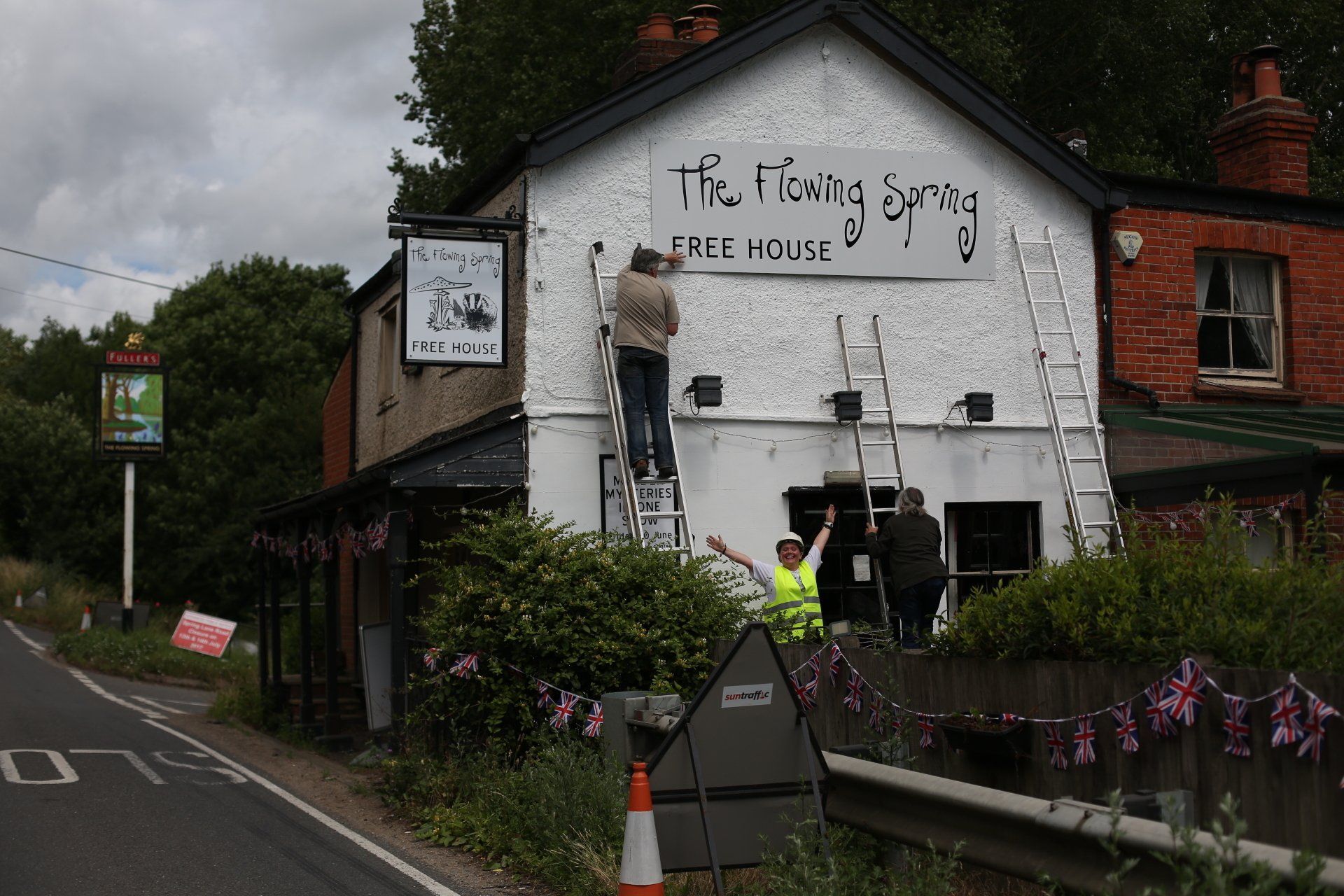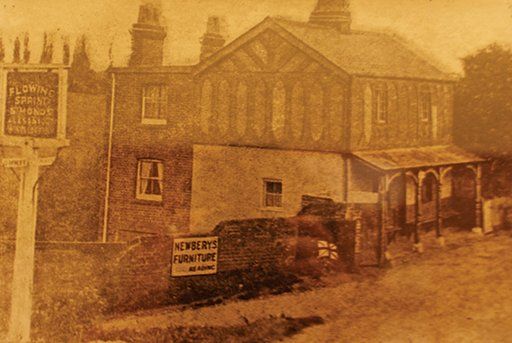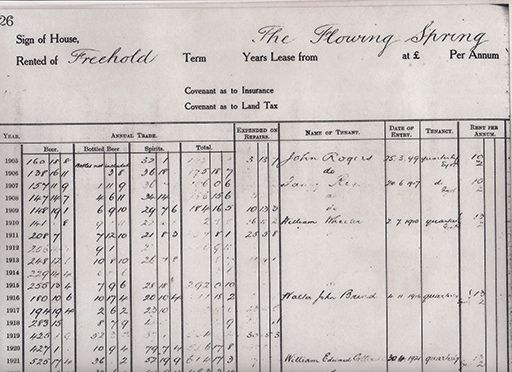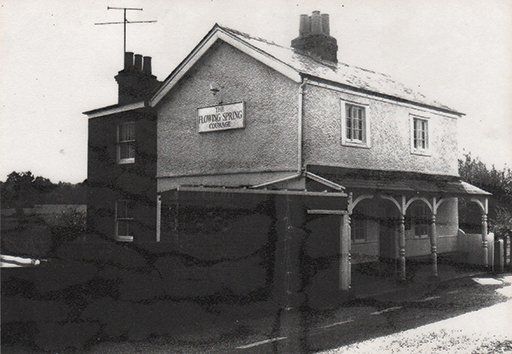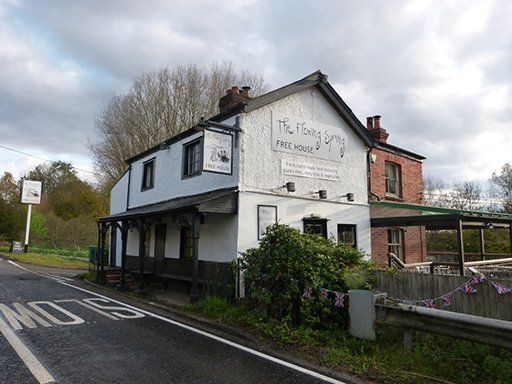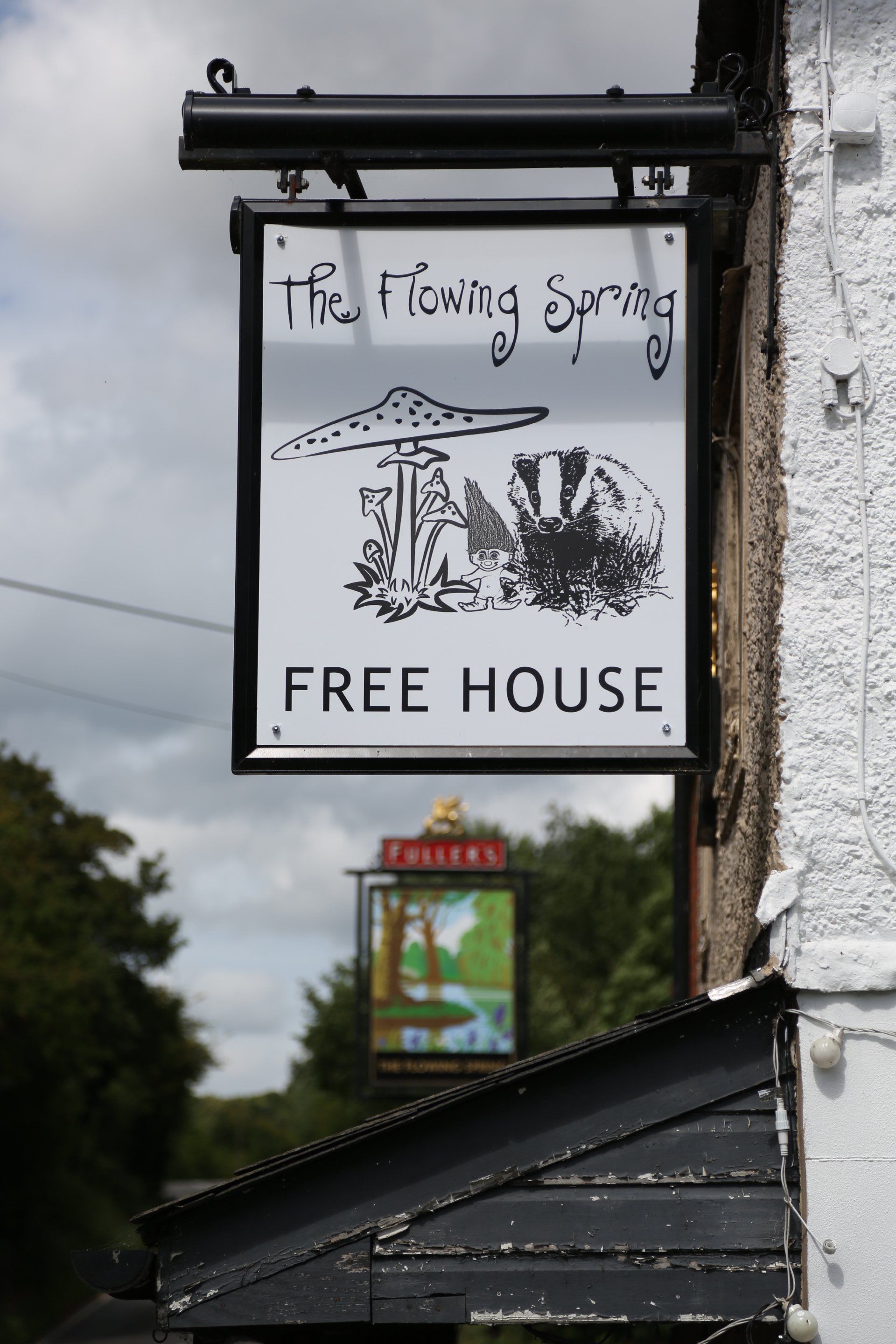THE HISTORY
Of The Flowing Spring
Situated 183 feet above sea level, the Flowing Spring is thought to be the only pub of its name in the world. In the parish of Sonning Eye, the pub derives its name from the natural spring which rises on the opposite side of Spring Lane at the foot of the Hawthorn Bush.
The chalk of the Chiltern Hills slips below the gravel and silt of the Thames flood plain and the water is forced up through the spring.
Prior to mains water, the pub used the spring for its water supply and, in previous centuries, the spring was hailed as a cure for eyesight problems.
In the early 1900s the spring was much better kept, with boarded edges and a clean wide gravel bed where watercress flourished. Special trips were made to the spring to gather the watercress, used to make watercress sandwiches for tea at the non-conformist chapel in Sonning.
Customers recall having great fun catching little water fleas in the ice cold water and some say there is a tiny shrimp resident in the stream, not found anywhere else in the world.
The fields all around were once used for withy beds (osiers). This is reflected in some of the names on the Phillimore Estate field map. Willow whips were harvested and soaked in ponds which were a feature of several Sonning Eye gardens. The withies were then 'stripped' by passing through a steel 'Y' shape which removed the bark. Once dried and trimmed they were sent off by horse and cart to basket makers, many of which were in the Worcestershire area. The trade was linked to the cider orchards there, but was in decline until the First World War created a demand for baskets to hold shells. The end of the war meant the end of the industry.
The stream running round two sides of the Flowing Spring garden is Berry Brook, mentioned in the Domesday Book of 1086. It originates in Caversham at the foot of the escarpment and is joined by 'Eye Marsh Drain' before running out by Shiplake College Boat Club. The Drain travels across land known as Big Common just outside the pub. This common land was eventually enclosed, and under the will of William Payne, the owners were required to pay a tax on it for grazing rights. The money was used to pay for apprentices' tools. The land passed to Mill Farm and when the mill was sold a payment continued to be made by many of the residents of Sonning Eye, right up until the early 1970s, when the charity was wound up. Until then the small sums collected were used to help the less well-off.
The oldest part of our building is believed to be built in the early 1800s, with it appearing on an Ordnance Survey map dated 1803. Some of the original building remains, particularly the cellar (our favourite room) and several of the rooms in the bar which have walls of wattle and daub. It has clearly been extended several times over the years, most recently in the late 1990s. It is unclear how long the Flowing Spring has been trading as a public house or what, if anything, it was before.
We have now traced back census records to 1841 when Elizabeth Goodwin was publican (born 1806). It appears she ran the pub alone and had just one, lodger, a William Harling, a carpenter aged 75. Interestingly, the 1851 census documents refer to the building as ‘Pool Spring’ when a 40 year-old Thomas Russell was publican, living here with his wife, four children and neice, all of whom were of school age. The census of 1891 gives the building the name ‘The Flowing Spring’ for the first time, with a John Rogers as Public House Keeper, living with his wife, Fanny, and five children plus Thomas Wheeler who was a lodger and Lime Maker. We understand brewers Hewett and Co of Waltham St Lawrence owned the pub from around 1840 and grew an estate of around 42 pubs at its peak. On 21 December 1899 Hewett's sold the premises to the much larger Reading brewery, H & G Simonds for £1298 including stamp duty. With the help of a builder working on a property in Shurlock Row, we now know exactly where Hewett & Co was located and Henry Hewett turns out to be quite an important figure in the village at that time.
In 1901, 10 people resided in this small building, with Albert Maskell named as Licensed Victualler. Apart from his family there were 2 farm workers, a rod cutter and a domestic servant living in.
Ten years later the census shows William Wheeler as Inn Keeper, living with his wife Ellen Ann. William was born in Nettlebed. An old document we have found (extract below) shows the pub's turnover as £237. The annual rent was just £13.
In 1916 the pub was run by Walter John Brind and, in 1921 by William Edward Cotterill.
Simonds brewery was later incorporated by Courage which eventually sold the premises to Fuller's in 1980. We have been given a fantastic folder of photos and commentary by Janice Tomlin who was the landlady here, along with her landlord husband Derek from 1981 to 1985. She says: "When we came here there was no mains water. We had an electric pump that pumped the spring water from under the pub. We had no gas or oil. We had a solid fuel stove in the cellar. There was no means of heating the kitchen and if we washed up after breakfast everything froze to the draining board in winter. When we ripped off the formica and boarding on the walls and knocked the previous tenant's private room into the bar we were lucky enough to find three working chimneys."
Nick and Hazel, tenants at the pub from 2010 purchased the freehold from Fuller's in June 2017. So, for the first time in the pub's history, it is a free house, no longer owned by a brewery. Being on the Thames flood plain it floods most winters, some times for up to four months but the couple continue to trade regardless.
In March 2020 the Covid-19 pandemic hit the country and pubs were forced to close. Over the three lockdowns imposed over the following year the pub remained open with its online shop, serving the community with takeaways and deliveries of meals, drinks and essentials.
The Flowing Spring still retains its charming, quirky character and continues to serve as a vital part of the community, bringing people together from far and wide.
Many thanks to everyone who has helped us compile this information, including David Woodward, Chairman of Eye and Dunsden Parish Council, Ron Wilson, Dave Smith and Janice Tomlin. If you have any information about the pub's history we'd love to hear from you. Please call Nick on 0118 9699878 or email info@theflowingspringpub.co.uk.
The Flowing Spring, Henley Road, Playhatch, Reading, Oxfordshire RG4 9RB

